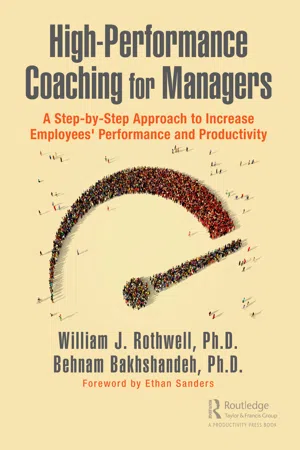
High-Performance Coaching for Managers
A Step-by-Step Approach to Increase Employees' Performance and Productivity
- 534 pages
- English
- ePUB (mobile friendly)
- Available on iOS & Android
High-Performance Coaching for Managers
A Step-by-Step Approach to Increase Employees' Performance and Productivity
About this book
Coaching is a necessary skill for managers. It is important as a fundamental part of an organization's talent efforts—including talent acquisition, development and retention strategies. For a coaching program to succeed in an organization, it should be recognized as a useful approach throughout the organization and become part of the fabric of the corporate culture. Performance Coaching for Managers provides an important tool for organizations to use to train their managers on coaching.
This book differs significantly from other books in the coaching market. Many books on coaching cast coaches as facilitators who question their clients (the coachees), helping them to articulate their own problems, formulate their own solutions, develop their own action plans to solve problems, and measure the success of efforts to implement those plans. That is called a nondirective approach.
But this book adopts a directive approach by casting the coach as a manager who diagnoses the problems with worker job performance and offers specific advice on how to solve those problems. While there is nothing wrong with a nondirective approach, it does not always work well in job performance reviews in which the manager must inform the worker about gaps between what is needed (the desired) and what is performed (the actual). The significant difference between what is currently available in the market and what is offered in this book is the authors' collective experience of over 70 combined years of hands-on research and delivery experiences in the Human Resources Development field.
According to the Harvard Business Review (2015), workers generally expect their immediate supervisors to give them honest feedback on how well they do their jobs—and specific advice on what to do if they are not performing in alignment with organizational expectations. When workers do not receive advice—but instead are questioned about their own views—they regard their managers as either incompetent or disingenuous.
Effective managers should be able to offer direction to their employees. After all, managers are responsible for ensuring that their organizational units deliver the results needed by the organization. If they fail to do that, the organization does not achieve its strategic goals. This book gives managers direction in how to offer directive coaching to their workers.
Frequently asked questions
- Essential is ideal for learners and professionals who enjoy exploring a wide range of subjects. Access the Essential Library with 800,000+ trusted titles and best-sellers across business, personal growth, and the humanities. Includes unlimited reading time and Standard Read Aloud voice.
- Complete: Perfect for advanced learners and researchers needing full, unrestricted access. Unlock 1.4M+ books across hundreds of subjects, including academic and specialized titles. The Complete Plan also includes advanced features like Premium Read Aloud and Research Assistant.
Please note we cannot support devices running on iOS 13 and Android 7 or earlier. Learn more about using the app.
Information
I BUILDING RELATIONSHIP AND RECOGNIZING THE SITUATION
- Chapter 4—Step 1: How to Establish Relatedness and Building Rapport?How can the consultant/manager establish rapport and a contractual relationship with a coaching client?
- Chapter 5—Step 2: What Is the Issue at Hand?What is the present situation that requires coaching? What is happening? Describe it in detail.
- Chapter 6—Step 3: What Should Be Happening?Describing the desired target, results, and outcome.
Chapter 4 Step 1: How to Establish Relatedness and Building Rapport?
- What is rapport and the importance of it?
- What are relatedness, empathy, and compassion?
- Rapport and basic psychological needs
- Rapport and synchrony
- Fundamental states of being and competencies for establishing relatedness and rapport
- Role of organization values and culture on rapport
- Key factors to remember from this chapter
- Some discussion questions to support manager-as-coach development
Some Definitions and Descriptions
Rapport
- “The relation characterized by harmony, conformity, accord, or affinity” (Merriam-Webster 2021).
- “Rapport is a positive connection with another person, one that involves caring and understanding” (Angelo 2012, 11).
- “I like to define rapport as a deep emotional connection and understanding between two people” (Gilmore 2019, 2).
- “Colloquially, rapport is the emotional experience of high-quality interactions. While the emotional experience of a high-quality interaction may often be associated with objective measures of high-quality interactions, this will not always be the case” (Baker, Watlington, and Knee 2020, 330).
- “Rapport is a process, a happening, an experience between two persons. It may not be a mutual affair at first, but the sharing of the experience and participation in it grows as each individual unfolds him or herself in the interpersonal situation” (Travelbee 1963, 70).
- “Rapport is one’s capability to establish a background of relatedness and connecting with others” (Bakhshandeh 2002, n.p.).
Relatedness
the definition of self and others can be regarded as embodying the two dimensions of autonomy and relatedness. Autonomy and relatedness are two basic human needs and cultural constructs at the same time. They may be differently defined yet remain equally important. The respective understanding of autonomy and relatedness is socialized during the everyday experiences of daily life routines from birth on
Table of contents
- Cover
- Endorsements
- Title
- Copyright
- Dedication
- Contents
- Foreword
- Preface
- Acknowledgments
- About the Authors
- Advance Organizer
- Building a Strong Foundation for High-Performance Coaching Journey
- Phase One—Building Relationship and Recognizing the Situation
- Phase Two—Analyzing the Gap
- Phase Three—Analyzing the Solution
- Phase Four—Implementation and Evaluation
- Support, Maintenance, Self-Evaluation, and Self-Rating
- Appendix A: Sources for Education and Implementations
- Index